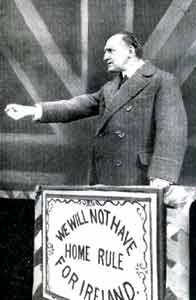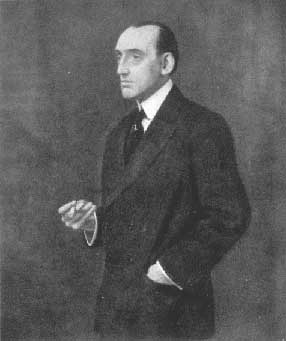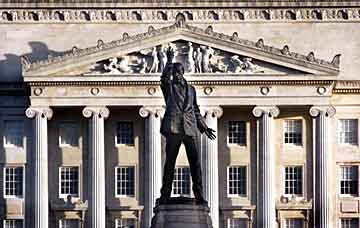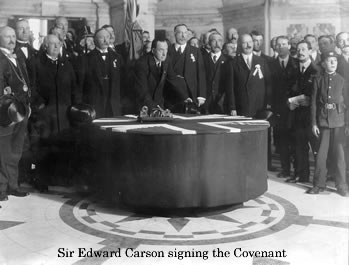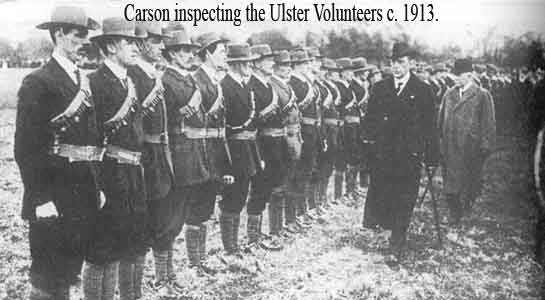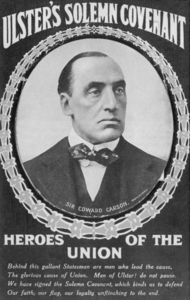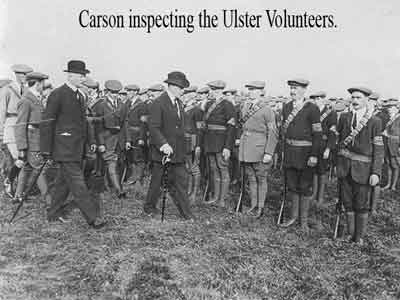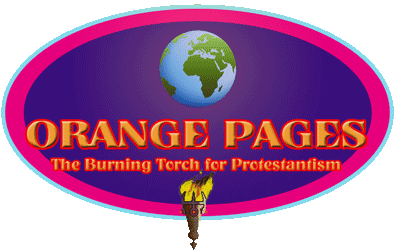 |
Edward Carson, Lord Carson of Duncairn.1854-1935
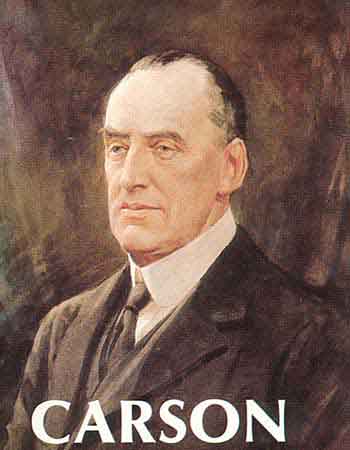
|
Edward Carson’s image is that of an intransigent unionist leader who helped raise the political temperature in Ireland and bring it to the brink of civil conflict. However, he himself felt a profound sense of unease about the measures then being taken by his supporters in Ulster.
In February 1910, Carson agreed to become leader of the Irish Unionist Parliamentary Party and in June 1911 accepted Craig’s invitation to lead the Ulster Unionists. He brought credibility and prestige to the movement. His objective throughout was to preserve the union between Britain and Ireland, believing it to be in the best interests of his fellow-countrymen; he was an Irish patriot, but not a nationalist. During the home rule crisis, 1912-14, he aimed to foment and use Ulster’s resistance as a means of blocking any granting of self-government to Ireland. Owing to his undoubted charisma, inspired oratory and unyielding image, he was hero-worshiped by unionists in the province of his adoption. Carson was deeply uneasy about the decision to establish an Ulster Volunteer Force and to run guns through Larne. However he accepted them as a means of applying additional pressure to the British government and so reaching the negotiated agreement he privately sought. By 1914, he had come to support Irish partition as a solution, fatalistically accepting that home rule was inevitable. By then his strategy had brought Ireland close to civil war.
Though Carson remained as unionist leader up to 1921, in wartime he spoke in favour of all-Ireland political institutions and structures, which lost him support in Ulster. Moreover, his energies were diverted into other areas. He played a significant role in the removal of Asquith as Prime Minister in 1916. During the conflict he also served in the British government, successively as Attorney General, First Lord of the Admiralty and in the War Cabinet. In 1919 he eagerly returned to his legal practice and he accepted a peerage in 1921. The Anglo-Irish Treaty (1921) was strongly criticised by him, but from a southern Irish unionist perspective. He died in 1935 and is buried in St. Anne’s Cathedral, Belfast. ‘Northern Ireland provided him with a tomb, but not a home.’
Ulster’s Solemn League and Covenant Being convinced in our consciences that Home Rule would be disastrous to the material well-being of Ulster as well as of the whole of Ireland, subversive of our civil and religious freedom, destructive of our citizenship and perilous to the unity of the Empire, we, whose names are underwritten, men of Ulster, loyal subjects of his Gracious Majesty King George V, humbly relying on the God whom our fathers in days of stress and trial confidently trusted, do hereby pledge ourselves in solemn Covenant throughout this our time of threatened calamity to stand by one another in defending for ourselves and our children our cherished position of equal citizenship in the United Kingdom and in using all means which may be found necessary to defeat the present conspiracy to set up a Home Rule Parliament in Ireland. And in the event of such a Parliament being forced upon us we further solemnly and mutually pledge ourselves to refuse to recognise its authority. In sure confidence that God will defend the right we hereto subscribe our names. And further, we individually declare that we have not already signed this Covenant. The above was signed by me at ___________________ Ulster Day, Saturday 28th, September, 1912.
On Covenant Day all commercial activities were suspended. In the early morning churches were crowded with worshippers invoking God to be with them in the solemn obligations they were about to undertake. In Belfast the loyalist population marched in formation to the City Hall, the Orange Brethren in regalia, where they were received by the Lord Mayor and Corporation. The corridors of the Hall, nearly half a mile in length, enabled 600 people to sign simultaneously. They came by 500s and passed out by the rear of the building leaving their signatures on a roll and each person carrying his signed covenant with him. The grand total of signatures of men and women was 471,414. The Covenant Day show of Ulster's determination took legs when the Ulster Volunteer Force was formed under Colonel R.H. Wallace with a strength of 110,000 men. In March, 1914, the Liberal Government decided to make an imposing demonstration of military force to overawe and coerce Ulster into accepting Home Rule. Whatever was the real motive the move led to the Curragh "Mutiny", better to be described as the Curragh Camp Incident, 20 March, when 58 out of 70 Army officers with General Hubert ough refused to move against the North, being prepared to accept dismissal before they would take up arms against their kin. The Ulster Volunteer Force with Colonel Fred. Crawford as organiser, ran guns from Germany after experiences by Crawford more exciting than fiction. The arms were landed 24 April, 1914, at Larne, with consignments laid off at Bangor and Donaghadee. Though Craig, who headed the Provisional Government of Ulster, made overtures to the British Government to stay the passing of the Home Rule Bill in view of the imminence of war - it broke out in August, 1914 - the Government persisted and it became law, 18 September, 1914. The Act was not operated because Britain had the Great War on her hands. In the war Ulstermen rallied to the British cause. The famous 36th Ulster Division was recruited from the U.V.F. to earn immortal fame for its prodigious sacrifice at the Somme, 1 July, 1916. Indeed Ulstermen went into service in all the theatres of war. Even before the Home Rule Bill was passed the Liberal Government had come to realise that Ulster could not be coerced into an Ireland ruled from Dublin. The Government of Ireland Act, which set up two legislatures in Ireland, one in Dublin, and the other in Belfast for the six counties of Northern Ireland, became law in December, 1920. From the outset of the campaign gainst Home Rule the Orange Order had taken a responsible part. There was a high standard of leadership utterly dedicated to the service of the Unionist and Protestant cause. The Grand Masters had been men of consequence, namely the Earl of Enniskillen, the Earl of Erne, Sir James Stronge, W.H. Lyons, and Sir Edward Archdale. They presided over brethren who responded to good leadership and who were concerned to back that leadership against all enemies. It is certain that without the Order the fight for the maintenance of the Union would have been lost.
|
